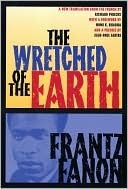As we catch the religiosity in Fanon's language of revolutionary wrath — "the last shall be the first," "the almighty body of violence rearing up . . ."8—and run it together with his description of the widening circle of national unity as reaching the "boiling point" in a way that "is reminiscent of a religious brotherhood, a church or a mystical doctrine,"9 we find ourselves both forewarned and wary of the ethnonationalist religious conflicts of our own times.
Welcome back. Just a moment while we sign you in to your Goodreads account.


